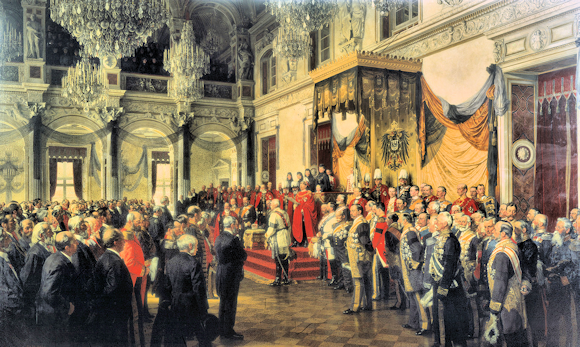 |
| Kaiser Wilhelm II with Chancellor Bismarck Present Opens a Session of the Reichstag |
By Dennis Cross
In 1912 Kaiser Wilhelm II celebrated his 24th year as emperor of Germany. A grandson of Queen Victoria, he ascended the throne during her reign, and for the next 13 years ruled Germany. Among European sovereigns, only Franz Joseph, the octogenarian emperor of Austria-Hungary, could claim longer tenure. In 1912 Wilhelm understandably regarded himself, if not as first among equals, at least as a force to be reckoned with. He also regarded himself, again not without reason, as the autocrat of the German Empire.
The Reichstag was the popularly elected legislative body of the German empire, but it had little power. The Kaiser had sole authority over foreign affairs, and even on domestic matters the Reichstag could vote only on proposals put forward by the government. Legislation had to be approved by the upper house of the legislature, the Bundesrat, which represented the princes of the German states and was dominated by Prussia. The chancellor and all the ministers of the government were named by the Kaiser, carried out the Kaiser's policies, and could not be removed by the legislature. Despite its institutional weaknesses, however, the Reichstag was in a position to cause difficulties for the government when controlled by opponents of government policies.
Reichstag elections were held on 12 January 1912. They resulted in a stunning victory for the Social Democratic Party, returning 110 SDP members, more than twice the number of the second-place Centre Party, which had previously held the most seats. The election results made possible a coalition of left-to-center parties with the potential to obstruct government policies and make life difficult for Chancellor Theobald von Bethmann-Hollweg.
On 7 February 1912, before British emissary Richard Haldane, the Kaiser spoke at the Reichstag announcing that a bill augmenting naval and army strength would be introduced later in the legislative session. The socialist dominated Reichstag, nonetheless, subsequently approved bills expanding the standing German army from 515,000 to 544,000, and construction of three more dreadnoughts and two light cruisers. When war broke out in 1914, the SPD parliamentary group unanimously voted to approve war credits on 4 August 1914. Yet, as the war dragged on the SPD support for the war diminished and the causcus fragmented. In 1917, its strong anti-war faction was expelled from the party, and they formed the Independent Social Democratic Party of Germany (USPD), which advocated an immediate end to the war.
Source: Originally presented in the Fall 2012 Journal of the World War One Historical Association

I appreciate this entry on the nature of the Reichstag at the time, which I've never really understood.
ReplyDelete